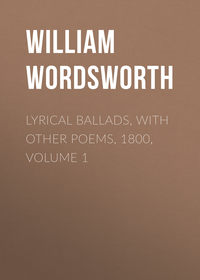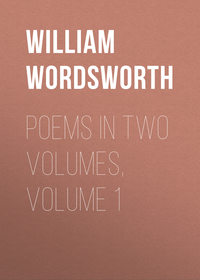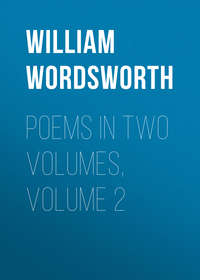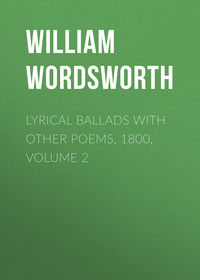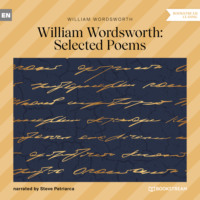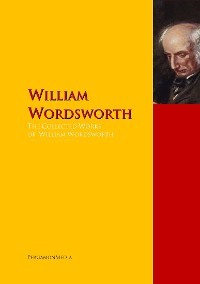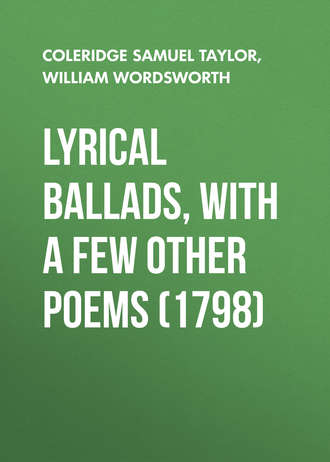 полная версия
полная версияLyrical Ballads, With a Few Other Poems (1798)
THE IDIOT BOY
Tis eight o'clock, – a clear March night,The moon is up – the sky is blue,The owlet in the moonlight air,He shouts from nobody knows where;He lengthens out his lonely shout,Halloo! halloo! a long halloo!– Why bustle thus about your door,What means this bustle, Betty Foy?Why are you in this mighty fret?And why on horseback have you setHim whom you love, your idiot boy?Beneath the moon that shines so bright,Till she is tired, let Betty FoyWith girt and stirrup fiddle-faddle;But wherefore set upon a saddleHim whom she loves, her idiot boy?There's scarce a soul that's out of bed;Good Betty! put him down again;His lips with joy they burr at you,But, Betty! what has he to doWith stirrup, saddle, or with rein?The world will say 'tis very idle,Bethink you of the time of night;There's not a mother, no not one,But when she hears what you have done,Oh! Betty she'll be in a fright.But Betty's bent on her intent,For her good neighbour, Susan Gale,Old Susan, she who dwells alone,Is sick, and makes a piteous moan,As if her very life would fail.There's not a house within a mile.No hand to help them in distress:Old Susan lies a bed in pain,And sorely puzzled are the twain,For what she ails they cannot guess.And Betty's husband's at the wood,Where by the week he doth abide,A woodman in the distant vale;There's none to help poor Susan Gale,What must be done? what will betide?And Betty from the lane has fetchedHer pony, that is mild and good,Whether he be in joy or pain,Feeding at will along the lane,Or bringing faggots from the wood.And he is all in travelling trim,And by the moonlight, Betty FoyHas up upon the saddle set,The like was never heard of yet,Him whom she loves, her idiot boy.And he must post without delayAcross the bridge that's in the dale,And by the church, and o'er the down,To bring a doctor from the town,Or she will die, old Susan Gale.There is no need of boot or spur,There is no need of whip or wand,For Johnny has his holly-bough,And with a hurly-burly nowHe shakes the green bough in his hand.And Betty o'er and o'er has toldThe boy who is her best delight,Both what to follow, what to shun,What do, and what to leave undone,How turn to left, and how to right.And Betty's most especial charge,Was, "Johnny! Johnny! mind that you"Come home again, nor stop at all,"Come home again, whate'er befal,"My Johnny do, I pray you do."To this did Johnny answer make,Both with his head, and with his hand,And proudly shook the bridle too,And then! his words were not a few,Which Betty well could understand.And now that Johnny is just going,Though Betty's in a mighty flurry,She gently pats the pony's side,On which her idiot boy must ride,And seems no longer in a hurry.But when the pony moved his legs,Oh! then for the poor idiot boy!For joy he cannot hold the bridle,For joy his head and heels are idle,He's idle all for very joy.And while the pony moves his legs,In Johnny's left-hand you may see,The green bough's motionless and dead;The moon that shines above his headIs not more still and mute than he.His heart it was so full of glee,That till full fifty yards were gone,He quite forgot his holly whip,And all his skill in horsemanship,Oh! happy, happy, happy John.And Betty's standing at the door,And Betty's face with joy o'erflows,Proud of herself, and proud of him,She sees him in his travelling trim;How quietly her Johnny goes.The silence of her idiot boy,What hopes it sends to Betty's heart!He's at the guide-post – he turns right,She watches till he's out of sight,And Betty will not then depart.Burr, burr – now Johnny's lips they burr,As loud as any mill, or near it,Meek as a lamb the pony moves,And Johnny makes the noise he loves,And Betty listens, glad to hear it.Away she hies to Susan Gale:And Johnny's in a merry tune,The owlets hoot, the owlets curr,And Johnny's lips they burr, burr, burr,And on he goes beneath the moon.His steed and he right well agree,For of this pony there's a rumour,That should he lose his eyes and ears,And should he live a thousand years,He never will be out of humour.But then he is a horse that thinks!And when he thinks his pace is slack;Now, though he knows poor Johnny well,Yet for his life he cannot tellWhat he has got upon his back.So through the moonlight lanes they go,And far into the moonlight dale,And by the church, and o'er the down,To bring a doctor from the town,To comfort poor old Susan Gale.And Betty, now at Susan's side,Is in the middle of her story,What comfort Johnny soon will bring,With many a most diverting thing,Of Johnny's wit and Johnny's glory.And Betty's still at Susan's side:By this time she's not quite so flurried;Demure with porringer and plateShe sits, as if in Susan's fateHer life and soul were buried.But Betty, poor good woman! she,You plainly in her face may read it,Could lend out of that moment's storeFive years of happiness or more,To any that might need it.But yet I guess that now and thenWith Betty all was not so well,And to the road she turns her ears,And thence full many a sound she hears,Which she to Susan will not tell.Poor Susan moans, poor Susan groans,"As sure as there's a moon in heaven,"Cries Betty, "he'll be back again;"They'll both be here, 'tis almost ten,"They'll both be here before eleven."Poor Susan moans, poor Susan groans,The clock gives warning for eleven;'Tis on the stroke – "If Johnny's near,"Quoth Betty "he will soon be here,"As sure as there's a moon in heaven."The clock is on the stroke of twelve,And Johnny is not yet in sight,The moon's in heaven, as Betty sees,But Betty is not quite at ease;And Susan has a dreadful night.And Betty, half an hour ago,On Johnny vile reflections cast;"A little idle sauntering thing!"With other names, an endless string,But now that time is gone and past.And Betty's drooping at the heart,That happy time all past and gone,"How can it be he is so late?"The doctor he has made him wait,"Susan! they'll both be here anon."And Susan's growing worse and worse,And Betty's in a sad quandary;And then there's nobody to sayIf she must go or she must stay:– She's in a sad quandary.The clock is on the stroke of one;But neither Doctor nor his guideAppear along the moonlight road,There's neither horse nor man abroad,And Betty's still at Susan's side.And Susan she begins to fearOf sad mischances not a few,That Johnny may perhaps be drown'd,Or lost perhaps, and never found;Which they must both for ever rue.She prefaced half a hint of thisWith, "God forbid it should be true!"At the first word that Susan saidCried Betty, rising from the bed,"Susan, I'd gladly stay with you."I must be gone, I must away,"Consider, Johnny's but half-wise;"Susan, we must take care of him,"If he is hurt in life or limb" —"Oh God forbid!" poor Susan cries."What can I do?" says Betty, going,"What can I do to ease your pain?"Good Susan tell me, and I'll stay;"I fear you're in a dreadful way,"But I shall soon be back again.""Good Betty go, good Betty go,"There's nothing that can ease my pain."Then off she hies, but with a prayerThat God poor Susan's life would spare,Till she comes back again.So, through the moonlight lane she goes,And far into the moonlight dale;And how she ran, and how she walked,And all that to herself she talked,Would surely be a tedious tale.In high and low, above, below,In great and small, in round and square,In tree and tower was Johnny seen,In bush and brake, in black and green,'Twas Johnny, Johnny, every where.She's past the bridge that's in the dale,And now the thought torments her sore,Johnny perhaps his horse forsook,To hunt the moon that's in the brook,And never will be heard of more.And now she's high upon the down,Alone amid a prospect wide;There's neither Johnny nor his horse,Among the fern or in the gorse;There's neither doctor nor his guide."Oh saints! what is become of him?"Perhaps he's climbed into an oak,"Where he will stay till he is dead;"Or sadly he has been misled,"And joined the wandering gypsey-folk."Or him that wicked pony's carried"To the dark cave, the goblins' hall,"Or in the castle he's pursuing,"Among the ghosts, his own undoing;"Or playing with the waterfall."At poor old Susan then she railed,While to the town she posts away;"If Susan had not been so ill,"Alas! I should have had him still,"My Johnny, till my dying day."Poor Betty! in this sad distemper,The doctor's self would hardly spare,Unworthy things she talked and wild,Even he, of cattle the most mild,The pony had his share.And now she's got into the town,And to the doctor's door she hies;Tis silence all on every side;The town so long, the town so wide,Is silent as the skies.And now she's at the doctor's door,She lifts the knocker, rap, rap, rap,The doctor at the casement shews,His glimmering eyes that peep and doze;And one hand rubs his old night-cap."Oh Doctor! Doctor! where's my Johnny?""I'm here, what is't you want with me?""Oh Sir! you know I'm Betty Foy,"And I have lost my poor dear boy,"You know him – him you often see;"He's not so wise as some folks be,""The devil take his wisdom!" saidThe Doctor, looking somewhat grim,"What, woman! should I know of him?"And, grumbling, he went back to bed."O woe is me! O woe is me!"Here will I die; here will I die;"I thought to find my Johnny here,"But he is neither far nor near,"Oh! what a wretched mother I!"She stops, she stands, she looks about,Which way to turn she cannot tell.Poor Betty! it would ease her painIf she had heart to knock again;– The clock strikes three – a dismal knell!Then up along the town she hies,No wonder if her senses fail,This piteous news so much it shock'd her,She quite forgot to send the Doctor,To comfort poor old Susan Gale.And now she's high upon the down,And she can see a mile of road,"Oh cruel! I'm almost three-score;"Such night as this was ne'er before,"There's not a single soul abroad."She listens, but she cannot hearThe foot of horse, the voice of man;The streams with softest sound are flowing,The grass you almost hear it growing,You hear it now if e'er you can.The owlets through the long blue nightAre shouting to each other still:Fond lovers, yet not quite hob nob,They lengthen out the tremulous sob,That echoes far from hill to hill.Poor Betty now has lost all hope,Her thoughts are bent on deadly sin;A green-grown pond she just has pass'd,And from the brink she hurries fast,Lest she should drown herself therein.And now she sits her down and weeps;Such tears she never shed before;"Oh dear, dear pony! my sweet joy!"Oh carry back my idiot boy!"And we will ne'er o'erload thee more."A thought is come into her head;"The pony he is mild and good,"And we have always used him well;"Perhaps he's gone along the dell,"And carried Johnny to the wood."Then up she springs as if on wings;She thinks no more of deadly sin;If Betty fifty ponds should see,The last of all her thoughts would be,To drown herself therein.Oh reader! now that I might tellWhat Johnny and his horse are doing!What they've been doing all this time,Oh could I put it into rhyme,A most delightful tale pursuing!Perhaps, and no unlikely thought!He with his pony now doth roamThe cliffs and peaks so high that are,To lay his hands upon a star,And in his pocket bring it home.Perhaps he's turned himself about,His face unto his horse's tail,And still and mute, in wonder lost,All like a silent horseman-ghost,He travels on along the vale.And now, perhaps, he's hunting sheep,A fierce and dreadful hunter he!Yon valley, that's so trim and green,In five months' time, should he be seen,A desart wilderness will be.Perhaps, with head and heels on fire,And like the very soul of evil,He's galloping away, away,And so he'll gallop on for aye,The bane of all that dread the devil.I to the muses have been bound,These fourteen years, by strong indentures;Oh gentle muses! let me tellBut half of what to him befel,For sure he met with strange adventures.Oh gentle muses! is this kind?Why will ye thus my suit repel?Why of your further aid bereave me?And can ye thus unfriended leave me?Ye muses! whom I love so well.Who's yon, that, near the waterfall,Which thunders down with headlong force,Beneath the moon, yet shining fair,As careless as if nothing were,Sits upright on a feeding horse?Unto his horse, that's feeding free,He seems, I think, the rein to give;Of moon or stars he takes no heed;Of such we in romances read,– 'Tis Johnny! Johnny! as I live.And that's the very pony too.Where is she, where is Betty Foy?She hardly can sustain her fears;The roaring water-fall she hears,And cannot find her idiot boy.Your pony's worth his weight in gold,Then calm your terrors, Betty Foy!She's coming from among the trees,And now, all full in view, she seesHim whom she loves, her idiot boy.And Betty sees the pony too:Why stand you thus Good Betty Foy?It is no goblin, 'tis no ghost,'Tis he whom you so long have lost,He whom you love, your idiot boy.She looks again – her arms are up —She screams – she cannot move for joy;She darts as with a torrent's force,She almost has o'erturned the horse,And fast she holds her idiot boy.And Johnny burrs and laughs aloud,Whether in cunning or in joy,I cannot tell; but while he laughs,Betty a drunken pleasure quaffs,To hear again her idiot boy.And now she's at the pony's tail,And now she's at the pony's head,On that side now, and now on this,And almost stifled with her bliss,A few sad tears does Betty shed.She kisses o'er and o'er again,Him whom she loves, her idiot boy,She's happy here, she's happy there,She is uneasy every where;Her limbs are all alive with joy.She pats the pony, where or whenShe knows not, happy Betty Foy!The little pony glad may be,But he is milder far than she,You hardly can perceive his joy."Oh! Johnny, never mind the Doctor;"You've done your best, and that is all."She took the reins, when this was said,And gently turned the pony's headFrom the loud water-fall.By this the stars were almost gone,The moon was setting on the hill,So pale you scarcely looked at her:The little birds began to stir,Though yet their tongues were still.The pony, Betty, and her boy,Wind slowly through the woody dale:And who is she, be-times abroad,That hobbles up the steep rough road?Who is it, but old Susan Gale?Long Susan lay deep lost in thought,And many dreadful fears beset her,Both for her messenger and nurse;And as her mind grew worse and worse,Her body it grew better.She turned, she toss'd herself in bed,On all sides doubts and terrors met her;Point after point did she discuss;And while her mind was fighting thus,Her body still grew better."Alas! what is become of them?"These fears can never be endured,"I'll to the wood." – The word scarce said,Did Susan rise up from her bed,As if by magic cured.Away she posts up hill and down,And to the wood at length is come,She spies her friends, she shouts a greeting;Oh me! it is a merry meeting,As ever was in Christendom.The owls have hardly sung their last,While our four travellers homeward wend;The owls have hooted all night long,And with the owls began my song,And with the owls must end.For while they all were travelling home,Cried Betty, "Tell us Johnny, do,"Where all this long night you have been,"What you have heard, what you have seen,"And Johnny, mind you tell us true."Now Johnny all night long had heardThe owls in tuneful concert strive;No doubt too he the moon had seen;For in the moonlight he had beenFrom eight o'clock till five.And thus to Betty's question, heMade answer, like a traveller bold,(His very words I give to you,)"The cocks did crow to-whoo, to-whoo,"And the sun did shine so cold."– Thus answered Johnny in his glory,And that was all his travel's story.LINES WRITTEN NEAR RICHMOND, UPON THE THAMES, AT EVENING
How rich the wave, in front, imprestWith evening-twilight's summer hues,While, facing thus the crimson west,The boat her silent path pursues!And see how dark the backward stream!A little moment past, so smiling!And still, perhaps, with faithless gleam,Some other loiterer beguiling.Such views the youthful bard allure,But, heedless of the following gloom,He deems their colours shall endure'Till peace go with him to the tomb.– And let him nurse his fond deceit,And what if he must die in sorrow!Who would not cherish dreams so sweet,Though grief and pain may come to-morrow?Glide gently, thus for ever glide,O Thames! that other bards may see,As lovely visions by thy sideAs now, fair river! come to me.Oh glide, fair stream! for ever so;Thy quiet soul on all bestowing,'Till all our minds for ever flow,As thy deep waters now are flowing.Vain thought! yet be as now thou art,That in thy waters may be seenThe image of a poet's heart,How bright, how solemn, how serene!Such heart did once the poet bless,Who, pouring here a 3 later ditty,Could find no refuge from distress,But in the milder grief of pity.Remembrance! as we glide along,For him suspend the dashing oar,And pray that never child of SongMay know his freezing sorrows more.How calm! how still! the only sound,The dripping of the oar suspended!– The evening darkness gathers roundBy virtue's holiest powers attended.EXPOSTULATION AND REPLY
"Why William, on that old grey stone,"Thus for the length of half a day,"Why William, sit you thus alone,"And dream your time away?"Where are your books? that light bequeath'd"To beings else forlorn and blind!"Up! Up! and drink the spirit breath'd"From dead men to their kind."You look round on your mother earth,"As if she for no purpose bore you;"As if you were her first-born birth,"And none had lived before you!"One morning thus, by Esthwaite lake,When life was sweet I knew not why,To me my good friend Matthew spake,And thus I made reply."The eye it cannot chuse but see,"We cannot bid the ear be still;"Our bodies feel, where'er they be,"Against, or with our will."Nor less I deem that there are powers,"Which of themselves our minds impress,"That we can feed this mind of ours,"In a wise passiveness."Think you, mid all this mighty sum"Of things for ever speaking,"That nothing of itself will come,"But we must still be seeking?" – Then ask not wherefore, here, alone,"Conversing as I may,"I sit upon this old grey stone,"And dream my time away."THE TABLES TURNED; AN EVENING SCENE, ON THE SAME SUBJECT
Up! up! my friend, and clear your looks,Why all this toil and trouble?Up! up! my friend, and quit your books,Or surely you'll grow double.The sun above the mountain's head,A freshening lustre mellow,Through all the long green fields has spread,His first sweet evening yellow.Books! 'tis a dull and endless strife,Come, hear the woodland linnet,How sweet his music; on my lifeThere's more of wisdom in it.And hark! how blithe the throstle sings!And he is no mean preacher;Come forth into the light of things,Let Nature be your teacher.She has a world of ready wealth,Our minds and hearts to bless —Spontaneous wisdom breathed by health,Truth breathed by chearfulness.One impulse from a vernal woodMay teach you more of man;Of moral evil and of good,Than all the sages can.Sweet is the lore which nature brings;Our meddling intellectMisshapes the beauteous forms of things;– We murder to dissect.Enough of science and of art;Close up these barren leaves;Come forth, and bring with you a heartThat watches and receives.OLD MAN TRAVELLING; ANIMAL TRANQUILLITY AND DECAY, A SKETCH
The little hedge-row birds,That peck along the road, regard him not.He travels on, and in his face, his step,His gait, is one expression; every limb,His look and bending figure, all bespeakA man who does not move with pain, but movesWith thought – He is insensibly subduedTo settled quiet: he is one by whomAll effort seems forgotten, one to whomLong patience has such mild composure given,That patience now doth seem a thing, of whichHe hath no need. He is by nature ledTo peace so perfect, that the young beholdWith envy, what the old man hardly feels.– I asked him whither he was bound, and whatThe object of his journey; he replied"Sir! I am going many miles to take"A last leave of my son, a mariner,"Who from a sea-fight has been brought to Falmouth,And there is dying in an hospital."THE COMPLAINT OF A FORSAKEN INDIAN WOMAN
[When a Northern Indian, from sickness, is unable to continue his journey with his companions; he is left behind, covered over with Deer-skins, and is supplied with water, food, and fuel if the situation of the place will afford it. He is informed of the track which his companions intend to pursue, and if he is unable to follow, or overtake them, he perishes alone in the Desart; unless he should have the good fortune to fall in with some other Tribes of Indians. It is unnecessary to add that the females are equally, or still more, exposed to the same fate. See that very interesting work, Hearne's Journey from Hudson's Bay to the Northern Ocean. When the Northern Lights, as the same writer informs us, vary their position in the air, they make a rustling and a crackling noise. This circumstance is alluded to in the first stanza of the following poem.]
Before I see another day,Oh let my body die away!In sleep I heard the northern gleams;The stars they were among my dreams;In sleep did I behold the skies,I saw the crackling flashes drive;And yet they are upon my eyes,And yet I am alive.Before I see another day,Oh let my body die away!My fire is dead: it knew no pain;Yet is it dead, and I remain.All stiff with ice the ashes lie;And they are dead, and I will die.When I was well, I wished to live,For clothes, for warmth, for food, and fire;But they to me no joy can give,No pleasure now, and no desire.Then here contented will I lie;Alone I cannot fear to die.Alas! you might have dragged me onAnother day, a single one!Too soon despair o'er me prevailed;Too soon my heartless spirit failed;When you were gone my limbs were stronger,And Oh how grievously I rue,That, afterwards, a little longer,My friends, I did not follow you!For strong and without pain I lay,My friends, when you were gone away.My child! they gave thee to another,A woman who was not thy mother.When from my arms my babe they took,On me how strangely did he look!Through his whole body something ran,A most strange something did I see;– As if he strove to be a man,That he might pull the sledge for me.And then he stretched his arms, how wild!Oh mercy! like a little child.My little joy! my little pride!In two days more I must have died.Then do not weep and grieve for me;I feel I must have died with thee.Oh wind that o'er my head art flying,The way my friends their course did bend,I should not feel the pain of dying,Could I with thee a message send.Too soon, my friends, you went away;For I had many things to say.I'll follow you across the snow,You travel heavily and slow:In spite of all my weary pain,I'll look upon your tents again.My fire is dead, and snowy whiteThe water which beside it stood;The wolf has come to me to-night,And he has stolen away my food.For ever left alone am I,Then wherefore should I fear to die?My journey will be shortly run,I shall not see another sun,I cannot lift my limbs to knowIf they have any life or no.My poor forsaken child! if IFor once could have thee close to me,With happy heart I then would die,And my last thoughts would happy be,I feel my body die away,I shall not see another day.THE CONVICT
The glory of evening was spread through the west; – On the slope of a mountain I stood;While the joy that precedes the calm season of rest Rang loud through the meadow and wood."And must we then part from a dwelling so fair?" In the pain of my spirit I said,And with a deep sadness I turned, to repair To the cell where the convict is laid.The thick-ribbed walls that o'ershadow the gate Resound; and the dungeons unfold:I pause; and at length, through the glimmering grate, That outcast of pity behold.His black matted head on his shoulder is bent, And deep is the sigh of his breath,And with stedfast dejection his eyes are intent On the fetters that link him to death.'Tis sorrow enough on that visage to gaze. That body dismiss'd from his care;Yet my fancy has pierced to his heart, and pourtrays More terrible images there.His bones are consumed, and his life-blood is dried, With wishes the past to undo;And his crime, through the pains that o'erwhelm him, descried, Still blackens and grows on his view.When from the dark synod, or blood-reeking field, To his chamber the monarch is led,All soothers of sense their soft virtue shall yield, And quietness pillow his head.But if grief, self-consumed, in oblivion would doze, And conscience her tortures appease,'Mid tumult and uproar this man must repose; In the comfortless vault of disease.When his fetters at night have so press'd on his limbs, That the weight can no longer be borne,If, while a half-slumber his memory bedims, The wretch on his pallet should turn,While the jail-mastiff howls at the dull clanking chain, From the roots of his hair there shall startA thousand sharp punctures of cold-sweating pain, And terror shall leap at his heart.But now he half-raises his deep-sunken eye, And the motion unsettles a tear;The silence of sorrow it seems to supply, And asks of me why I am here."Poor victim! no idle intruder has stood "With o'erweening complacence our state to compare,"But one, whose first wish is the wish to be good, "Is come as a brother thy sorrows to share."At thy name though compassion her nature resign, "Though in virtue's proud mouth thy report be a stain,"My care, if the arm of the mighty were mine, "Would plant thee where yet thou might'st blossom again."

